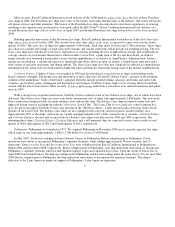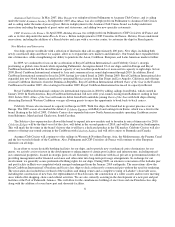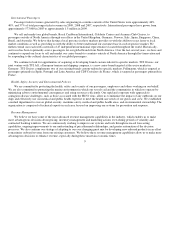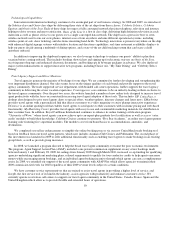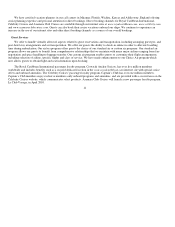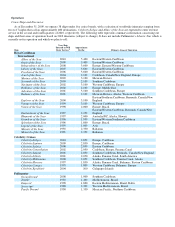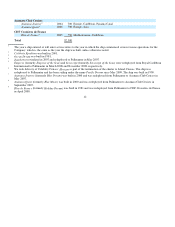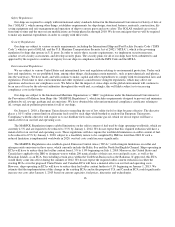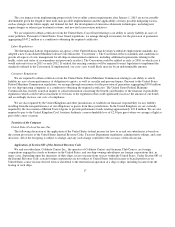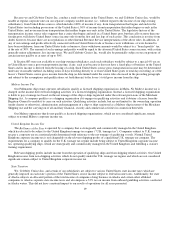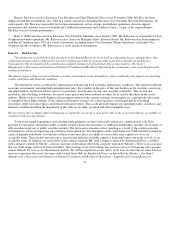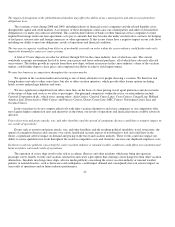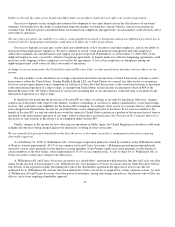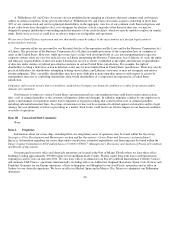Royal Caribbean Cruise Lines 2009 Annual Report Download - page 26
Download and view the complete annual report
Please find page 26 of the 2009 Royal Caribbean Cruise Lines annual report below. You can navigate through the pages in the report by either clicking on the pages listed below, or by using the keyword search tool below to find specific information within the annual report.
Safety Regulations
Our ships are required to comply with international safety standards defined in the International Convention for Safety of Life at
Sea (“SOLAS”), which among other things, establishes requirements for ship design, structural features, materials, construction, life
saving equipment and safe management and operation of ships to ensure guest and crew safety. The SOLAS standards are revised
from time to time and the most recent modifications are being phased in through 2010. We do not anticipate that we will be required
to make any material expenditures in order to comply with these rules.
Security Regulations
Our ships are subject to various security requirements, including the International Ship and Port Facility Security Code (“ISPS
Code”), which is part of SOLAS, and the U.S. Maritime Transportation Security Act of 2002 (“MTSA”), which is the governing
regulation for ships that operate in U.S. ports. In order to satisfy these security requirements, we implement security measures,
conduct vessel security assessments, and develop security plans. The security plans for all of our ships have been submitted to and
approved by the respective countries of registry for our ships in compliance with the ISPS Code and the MTSA.
Environmental Regulations
We are subject to various United States and international laws and regulations relating to environmental protection. Under such
laws and regulations, we are prohibited from, among other things, discharging certain materials, such as petrochemicals and plastics,
into the waterways. We have made, and will continue to make, capital and other expenditures to comply with environmental laws and
regulations. From time to time, environmental and other regulators consider more stringent regulations, which may affect our
operations and increase our compliance costs. We believe that the impact of cruise ships on the global environment will continue to
be an area of focus by the relevant authorities throughout the world and, accordingly, this will likely subject us to increasing
compliance costs in the future.
Our ships are subject to the International Maritime Organization’s (“IMO”) regulations under the International Convention for
the Prevention of Pollution from Ships (the “MARPOL Regulations”), which includes requirements designed to prevent and minimize
pollution by oil, sewage, garbage and air emissions. We have obtained the relevant international compliance certificates relating to
oil, sewage and air pollution prevention for all of our ships.
On January 1, 2010, a European Union directive regarding the use of low sulfur fuels for ships became effective. The directive
places a 0.1% sulfur content limit on all marine fuels used by such ships while berthed or anchored in European Union ports.
Compliance with this directive will require us to use distillate fuels such as marine gas oil, which we do not expect will have a
material effect on our fuel and operating costs.
The MARPOL Regulations impose global limitations on the sulfur content of fuel used by ships operating worldwide, which are
currently 4.5% and are required to be reduced to 3.5% by January 1, 2012. We do not expect that this required reduction will have a
material effect on our fuel and operating costs. These regulations will also require the worldwide limitations on sulfur content of fuel
to be reduced to 0.5% by January 1, 2020, subject to a feasibility review to be completed by IMO no later than 2018. If such a
reduced limitation is implemented worldwide in 2020, our fuel costs could increase significantly.
The MARPOL Regulations also establish special Emission Control Areas (“ECAs”) with stringent limitations on sulfur and
nitrogen oxide emissions in these areas, which currently include the Baltic Sea and the North Sea/English Channel. Ships operating in
ECAs will have to reduce their fuel sulfur content from 1.5% to 1.0% beginning on July 1, 2010. Moreover, the United States and
Canada have applied to the IMO to designate waters within 200 nautical miles of their east, west and gulf coasts, as well as the
Hawaiian Islands, as an ECA, but excluding certain areas within the Caribbean Basin such as the Bahamas. If approved, this ECA
would likely come into effect during the summer of 2012. We do not expect the required sulfur content reductions in either the
existing ECAs or in the proposed United States and Canadian ECA will have a material effect on our fuel and operating costs.
However, ships operating in ECAs will have to reduce their fuel sulfur content further to 0.1% beginning on January 1, 2015. We
estimate that the implementation of this change in the existing ECAs and in the proposed U.S. and Canadian ECA could significantly
increase our costs after January 1, 2015 based on current capacities, fuel prices, itineraries and technologies.
16


